Related Research Articles

Aleksandr Isayevich Solzhenitsyn was a Russian author and Soviet dissident who helped to raise global awareness of political repression in the Soviet Union, especially the Gulag prison system. He was awarded the 1970 Nobel Prize in Literature "for the ethical force with which he has pursued the indispensable traditions of Russian literature". His non-fiction work The Gulag Archipelago "amounted to a head-on challenge to the Soviet state" and sold tens of millions of copies.
The history of Moldova can be traced to the 1350s, when the Principality of Moldavia, the medieval precursor of modern Moldova and Romania, was founded. The principality was a vassal of the Ottoman Empire from 1538 until the 19th century. In 1812, following one of several Russian–Turkish wars, the eastern half of the principality, Bessarabia, was annexed by the Russian Empire. In 1918, Bessarabia briefly became independent as the Moldavian Democratic Republic and, following the decision of the Parliament, united with Romania. During the Second World War it was occupied by the Soviet Union which reclaimed it from Romania. It joined the Union in 1940 as the Moldavian SSR, until the dissolution of the USSR. In 1991 the country declared independence as the Republic of Moldova.

The Hoover Institution is an American public policy think tank which promotes personal and economic liberty, free enterprise, and limited government. While the institution is formally a unit of Stanford University, it maintains an independent board of overseers and relies on its own income and donations. It is widely described as conservative, although its directors have contested the idea that it is partisan.

LDPR — Liberal Democratic Party of Russia is a Russian ultranationalist and right-wing populist political party in Russia. It succeeded the Liberal Democratic Party of the Soviet Union (LDPSU) in Russia after the dissolution of the Soviet Union. The party was led by Vladimir Zhirinovsky since its inception until his death in April 2022. Opposing both communism and capitalism of the 1990s, the party scored a major success in the 1993 Duma elections with almost 23% of the vote, giving it 64 seats of the 450 seats in the State Duma. In the 2021 elections, the party received 7.55% of the vote, giving it 21 seats.
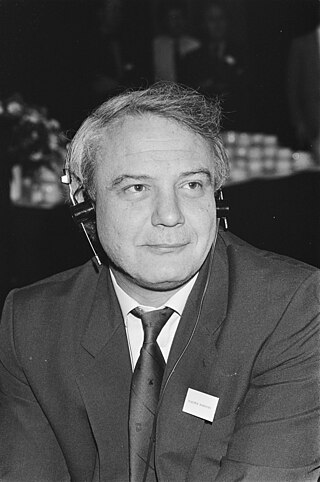
Vladimir Konstantinovich Bukovsky was a Russian-born British human rights activist and writer. From the late 1950s to the mid-1970s, he was a prominent figure in the Soviet dissident movement, well known at home and abroad. He spent a total of twelve years in the psychiatric prison-hospitals, labour camps, and prisons of the Soviet Union during Brezhnev rule.

Andrei Donatovich Sinyavsky was a Russian writer and Soviet dissident known as a defendant in the Sinyavsky–Daniel trial of 1965.
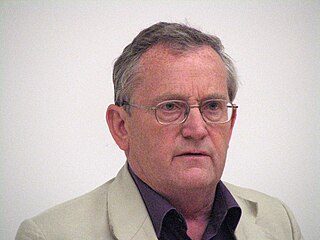
Robert John Service is a post-revisionist British historian, academic, and author who has written extensively on the history of the Soviet Union, particularly the era from the October Revolution to Stalin's death. He was until 2013 a professor of Russian history at the University of Oxford, a Fellow of St Antony's College, Oxford, and a senior Fellow at Stanford University's Hoover Institution. He is best known for his biographies of Vladimir Lenin, Joseph Stalin, and Leon Trotsky. He has been a fellow of the British Academy since 1998.

Aleksandr Gelyevich Dugin is a Russian far-right political philosopher.
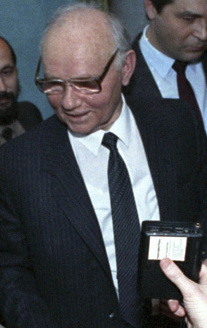
Vladimir Aleksandrovich Kryuchkov was a Soviet lawyer, diplomat, and head of the KGB, member of the Politburo of the Central Committee of the CPSU.

Bertram David Wolfe was an American scholar, leading communist, and later a leading anti-communist. He authored many works related to communism, including biographical studies of Vladimir Lenin, Joseph Stalin, Leon Trotsky, and Diego Rivera.
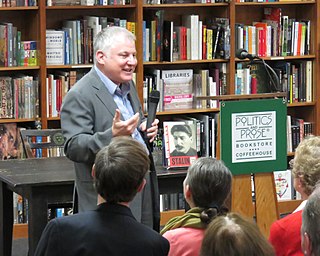
Stephen Mark Kotkin is an American historian, academic, and author. He is the Kleinheinz Senior Fellow at the Hoover Institution and a senior fellow at the Freeman Spogli Institute for International Studies at Stanford University. For 33 years, Kotkin taught at Princeton University, where he attained the title of John P. Birkelund '52 Professor in History and International Affairs; he took on emeritus status from Princeton University in 2022. He was the director of the Princeton Institute for International and Regional Studies and the co-director of the certificate-granting program in History and the Practice of Diplomacy. He has won a number of awards and fellowships, including the Guggenheim Fellowship, the American Council of Learned Societies, and the National Endowment for the Humanities Fellowship. He is the husband of curator and art historian Soyoung Lee, and the younger brother of columnist Joel Kotkin.
Eurasianism is a socio-political movement in Russia that emerged in the early 20th century under the Russian Empire, which states that Russia does not belong in the "European" or "Asian" categories but instead to the geopolitical concept of Eurasia governed by the "Russian world", forming an ostensibly standalone Russian civilization.

Russian nationalism is a form of nationalism that promotes Russian cultural identity and unity. Russian nationalism first rose to prominence as a Pan-Slavic enterprise during the 19th century Russian Empire, and was repressed during the early Bolshevik rule. Russian nationalism was briefly revived through the policies of Joseph Stalin during and after the Second World War, which shared many resemblances with the worldview of early Eurasianist ideologues.
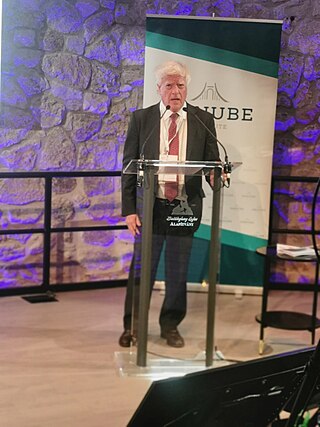
David A. Satter is an American journalist and historian who writes about Russia and the Soviet Union. He has authored books and articles about the decline and fall of the Soviet Union and the rise of post-Soviet Russia. Satter was expelled from Russia by the government in 2013. He is perhaps best known as the first researcher who claimed that Vladimir Putin and Russia's Federal Security Service were behind the 1999 Russian apartment bombings and is particularly critical of Putin's rise to the Russian presidency.
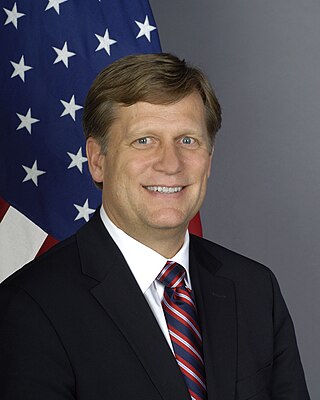
Michael Anthony McFaul is an American academic and diplomat who served as the United States ambassador to Russia from 2012 to 2014. McFaul became the Ken Olivier and Angela Nomellini Professor in International Studies in the Department of Political Science at Stanford University in 1995, where he is the Director of the Freeman Spogli Institute for International Studies. He is also a Peter and Helen Bing Senior Fellow at the Hoover Institution. He is also a contributing columnist at The Washington Post. Prior to his nomination to the ambassadorial position, McFaul worked for the U.S. National Security Council as Special Assistant to the President and senior director of Russian and Eurasian affairs, where he was the architect of U.S. President Barack Obama's Russian reset policy.
Richard Felix Staar was an American political scientist and historian. He held a position of senior fellow at Stanford University's Hoover Institution. His areas of specialization included Russia and East-Central Europe, military strategy, national security, arms control, and public diplomacy. He was an author of numerous books and articles.
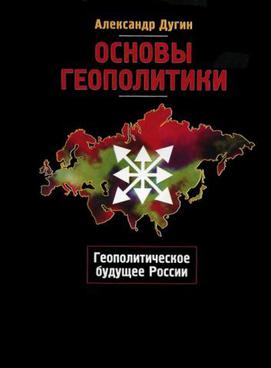
The Foundations of Geopolitics: The Geopolitical Future of Russia is a geopolitical book by Aleksandr Dugin. Its publication in 1997 was well received in Russia; it has had significant influence within the Russian military, police forces, and foreign policy elites, and has been used as a textbook in the Academy of the General Staff of the Russian military. Powerful Russian political figures subsequently took an interest in Dugin, a Russian political analyst who espouses an ultra-nationalist and neo-fascist ideology based on his idea of neo-Eurasianism, who has developed a close relationship with Russia's Academy of the General Staff.

Putinism is the social, political, and economic system of Russia formed during the political leadership of Vladimir Putin. It is characterized by the concentration of political and financial powers in the hands of "siloviks", current and former "people with shoulder marks", coming from a total of 22 governmental enforcement agencies, the majority of them being the Federal Security Service (FSB), Ministry of Internal Affairs of Russia, Armed Forces of Russia, and National Guard of Russia. According to Arnold Beichman, "Putinism in the 21st century has become as significant a watchword as Stalinism was in the 20th."
Vladimir Nikolaevich Osipov was a Russian writer who founded the Soviet samizdat journal Veche (Assembly). The journal is considered to be an important document of the nationalist or Slavophile strand within the Soviet dissident movement.

Ruscism is a Ukrainian neologism and derogatory term used by a number of scholars, politicians and publicists to describe the political ideology and the social practices of the Russian state in the late 20th and early 21st centuries, especially during the rule of Vladimir Putin. It is also used in reference to the ideology of Russian military expansionism, and has been used as a label to describe an undemocratic system and nationality cult mixed with ultranationalism and a cult of personality. That transformation was described as based on the ideas of the "special civilizational mission" of the Russians, such as Moscow as the third Rome and expansionism, which manifests itself in anti-Westernism and supports regaining former lands by conquest. Ukrainian officials and media often use 'Rashist' to broadly refer to members and backers of the Russian Armed Forces.
References
- 1 2 Dunlop's profile at the Hoover Institution.